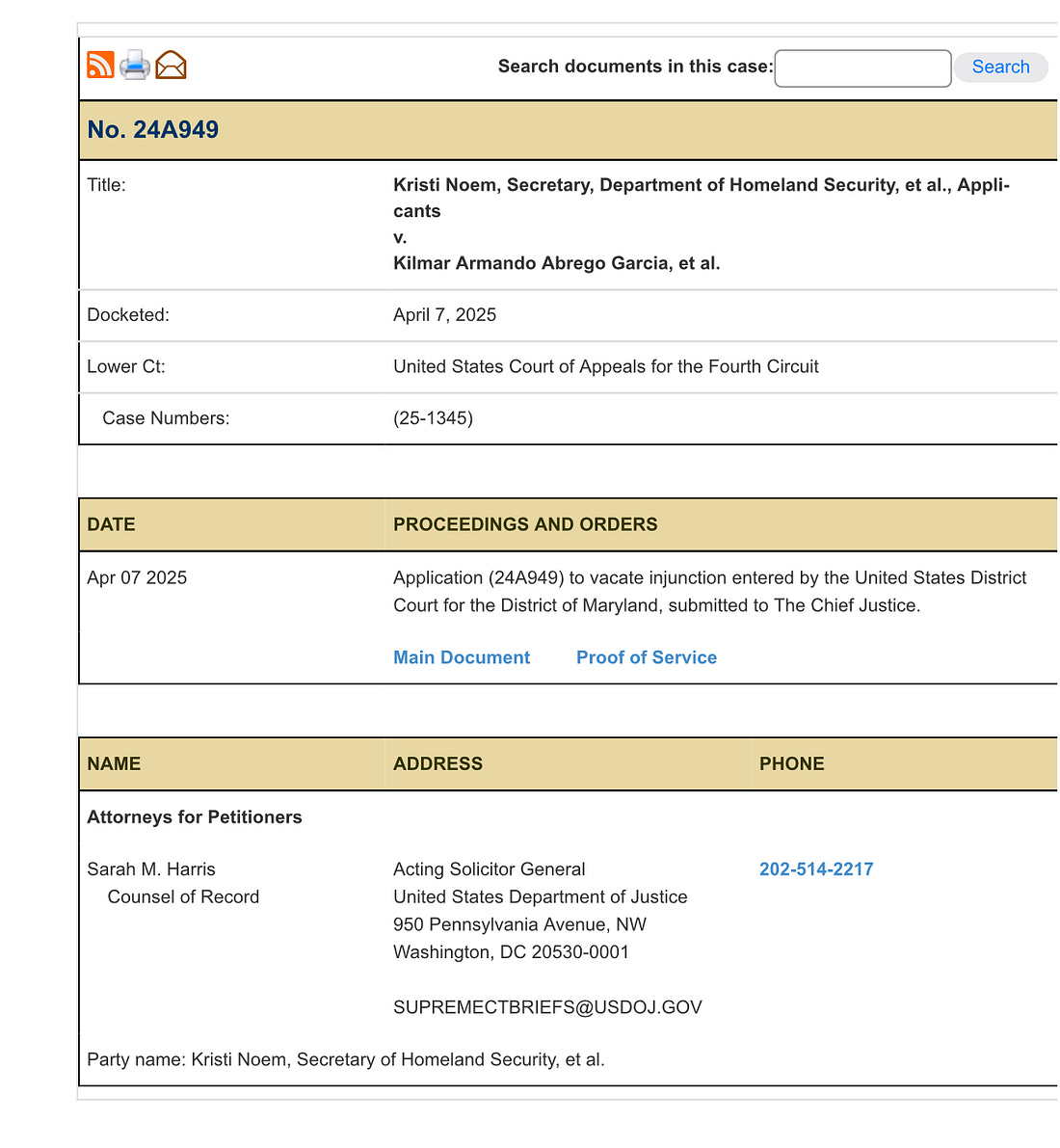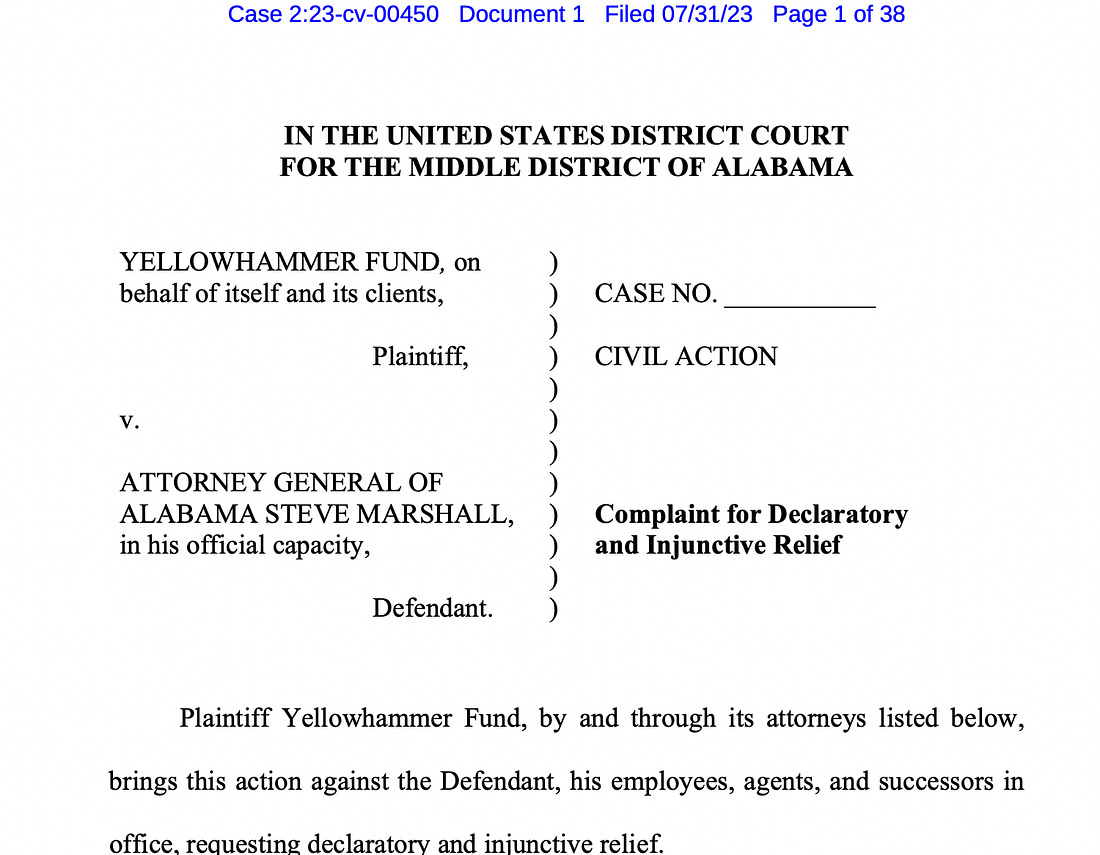A Case to WatchProgramming Note: Wednesday evening at 8:30 ET/7:30 Central, Marc Elias will be joining me for a Substack Live to discuss the North Carolina Supreme Court case and the other critical legal issues of the day. To join us, make sure you have the Substack app downloaded, then open it up at the appointed time to get a notice to join us. You should get both that “push” notice and one via email as well if you’re subscribed to this newsletter. Looking forward to seeing you there! There is a case I want to write to you about tonight, a case that was decided last week but has gotten lost in the press of so much news on all fronts. Today was no different:
All of that was before noon, which gives us a sense of the sort of presidentially fostered mayhem the country is facing. But we’ve dispensed with it, so we can discuss the case I intended to write to you about, Yellowhammer Fund v. Marshall. The Yellowhammer Fund is a 501(c)3 abortion advocacy and reproductive justice organization serving Alabama, Mississippi, and the Deep South. They provide free emergency contraceptives. They sued Alabama’s Attorney General, Steve Marshall, on July 31, 2023. You can read the lawsuit here. A related case was filed by an obstetrician and two former abortion clinics that continue to provide contraception and other health services. The plaintiffs start their case by explaining that “This is a civil rights action about helpers and the active infringement of their constitutional rights in the State of Alabama. ‘Helpers’ are the people who aid others in accessing their rights. The desire and willingness to aid those in need or facing persecution, even at cost to oneself, are not just American values; they are foundational to a civilized society and part of what makes us human.” Abortion is subject to a total ban in Alabama. The Yellowhammer Fund helps people access abortion in other states where it remains legal. Marshall is opposed to this and threatened, according to the complaint, that he would prosecute abortion funds and practical support organizations for the lawful conduct of helping people get care in states where its provision is legal. The lawsuit argues that it violates their First Amendment rights and illegally tries to apply Alabama’s laws extraterritorially to prevent aid to pregnant Alabamians seeking to exercise their federal constitutional rights to travel out of Alabama and access lawful abortion care in other states. They also allege violation of other constitutional rights. Alabama’s Abortion ban is only valid within its borders, and Marshall has conceded “[t]here is nothing about the [Abortion Ban] that restricts any individual from driving across state lines and seeking an abortion in another place,” according to the lawsuit. The Supreme Court’s case law is long established and clear; as far back as Nielsen v. Oregon in 1909, they held a person can’t be prosecuted in one state for acts they did in another state that were legal there. Shortly after the Supreme Court handed down its decision in Dobbs, which took away women’s reproductive rights, Marshall appeared on a local talk radio program and, when asked if someone who helped a woman get an out of state abortion, responded that he would “look closely” for the possibility of criminal prosecution at groups like the Yellowhammer Fund that tried to help. In essence, the threat of prosecution was meant to chill people’s exercise of their Constitutional rights. Marshall also spoke at a Federalist Society meeting where he said that “Alabama law has a criminal conspiracy statute that could apply to attempts to procure an abortion out of state.” The Yellowhammer Fund asked the court for declaratory and injunctive relief. Specifically, they asked the court for relief to prevent the state of Alabama from applying its laws beyond its state borders and to prevent it from threatening to do so in a way that interfered with their exercise of their rights. Judge Myron Thompson granted summary judgment in favor of the plaintiffs on most of the claims, ruling that the threatened prosecutions would violate the First Amendment and a person’s right to travel: “It is DECLARED that the defendant’s use of the provisions of Alabama’s criminal code to prosecute those who assist individuals seeking to leave Alabama to obtain abortion care in a State where abortion is legal would violate both the First Amendment and the right to travel.” He compared the case to one where the state might try to prosecute men who attended a bachelor party in Las Vegas and engaged in gambling, which is illegal in Alabama. He wrote, “It is one thing for Alabama to outlaw by statute what happens in its own backyard. It is another thing for the state to enforce its values and laws, as chosen by the attorney general, outside its boundaries by punishing its citizens and others who help individuals travel to another state to engage in conduct that is lawful there but the attorney general finds to be contrary to Alabama’s values and laws.” The Attorney General said after the judgment that he was considering his options. If he appeals, the case will go to the Eleventh Circuit Court of Appeals, a court that, before Dobbs, issued an opinion in an abortion case that began “that there is constitutional law and then there is the aberration of constitutional law relating to abortion.” The court said it was bound to follow Supreme Court precedent on abortion and grudgingly allowed Alabama women their rights, but they made their views clear: “What we must apply here is the aberration.” The court wrote that the commonly used dilation and evacuation (D&E) procedure routinely used for abortions was better described by the state of Alabama, which called it, “dismemberment abortion … That name is more accurate because the method involves tearing apart and extracting piece-by-piece from the uterus what was until then a living unborn child.” The court’s view on abortion is clear. But this case, if the attorney general appeals it, is not about abortion. At least not really. It’s about whether the helpers can help people go to states where abortion is still legal to get the procedure. It’s about whether women are free to leave the state they live in to travel elsewhere and do things that are not legal in their home state. It’s clear that both of these things are legal under our laws. People travel to states where marijuana is legal, to states where prostitution is legal, and to states where gambling is legal. Their home states may not want to have these things within their borders, but nothing prevents people from traveling elsewhere. The question is, will highly conservative courts view the issues any differently when they involve women’s rights and abortion? In other words, this is a case we will be keeping a close eye on. Thank you for subscribing to Civil Discourse in this difficult time where we are each trying to figure out what we can and should be doing. None of this is easy, but I appreciate your support for the newsletter—your support and paid subscriptions help make it possible, and I truly believe we are helping more people understand how important it is to “keep the Republic.” We’re in this together, Joyce |


![FN 4:
4Of note, in response to the candid responses by the Government attorney to the district court’s inquiry, that attorney has been put on administrative leave, ostensibly for lack of “zealous[] advocacy.” Evan Perez, Paula Reid and Katie Bo Lillis, DOJ attorney placed on leave after expressing frustration in court with government over mistakenly deported man, CNN (Apr. 5, 2025, 10:40 PM), https://www.cnn.com/2025/04/05/politics/doj-attorney-leave-maryland-fatherdeportation/index.html; see also Glenn Thrush, Justice Dept. Lawyer Who Criticized Administration in Court Is Put on Leave, New York Times (Apr. 5, 2025, 5:41 PM), https://www.nytimes.com/2025/04/05/us/politics/justice-dept-immigration-lawyerleave.html. But, the duty of zealous representation is tempered by the duty of candor to the court, among other ethical obligations, and the duty to uphold the rule of law, particularly on the part of a Government attorney. United States Department of Justice, Home Page, https://www.justice.gov/ (last visited Apr. 6, 2025) (“Our employees adhere to the highest standards of ethical behavior, mindful that, as public servants, we must work to earn the trust of, and inspire confidence in, the public we serve.”). FN 4:
4Of note, in response to the candid responses by the Government attorney to the district court’s inquiry, that attorney has been put on administrative leave, ostensibly for lack of “zealous[] advocacy.” Evan Perez, Paula Reid and Katie Bo Lillis, DOJ attorney placed on leave after expressing frustration in court with government over mistakenly deported man, CNN (Apr. 5, 2025, 10:40 PM), https://www.cnn.com/2025/04/05/politics/doj-attorney-leave-maryland-fatherdeportation/index.html; see also Glenn Thrush, Justice Dept. Lawyer Who Criticized Administration in Court Is Put on Leave, New York Times (Apr. 5, 2025, 5:41 PM), https://www.nytimes.com/2025/04/05/us/politics/justice-dept-immigration-lawyerleave.html. But, the duty of zealous representation is tempered by the duty of candor to the court, among other ethical obligations, and the duty to uphold the rule of law, particularly on the part of a Government attorney. United States Department of Justice, Home Page, https://www.justice.gov/ (last visited Apr. 6, 2025) (“Our employees adhere to the highest standards of ethical behavior, mindful that, as public servants, we must work to earn the trust of, and inspire confidence in, the public we serve.”).](https://ecp.yusercontent.com/mail?url=https%3A%2F%2Fsubstackcdn.com%2Fimage%2Ffetch%2Fw_1100%2Cc_limit%2Cf_auto%2Cq_auto%3Agood%2Cfl_progressive%3Asteep%2Fhttps%253A%252F%252Fsubstack-post-media.s3.amazonaws.com%252Fpublic%252Fimages%252Ffb3071a5-81fb-425b-9d4f-4743a6c76c56_903x442.jpeg&t=1744107639&ymreqid=ce20d81c-da90-a934-1cb1-ea0004017e00&sig=Imow.aFA3fOmxFXngUzdGg--~D)



No comments:
Post a Comment
Note: Only a member of this blog may post a comment.